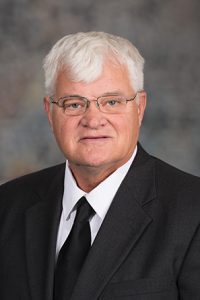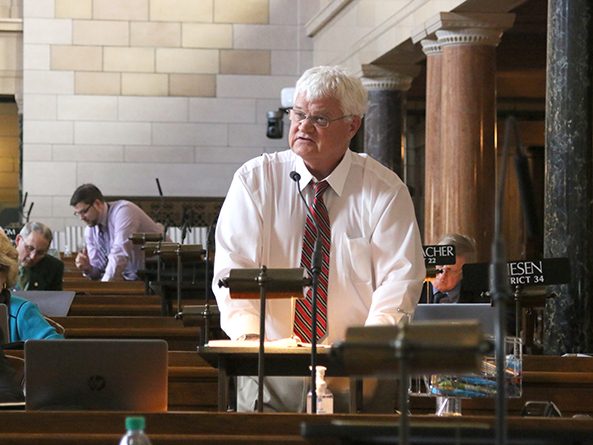Physical restraint of unruly students debated
Lawmakers debated a bill April 24 that would authorize teachers to restrain violent students and remove unruly students from the classroom without facing legal action.
Introduced by Sen. Mike Groene of North Platte, LB595 would allow teachers and administrators to use physical force or restraint to subdue a student who becomes violent toward himself or herself, another student, a teacher or an administrator. A teacher or administrator also could restrain a student who is destroying school property.
The proposal also would allow a teacher to remove a student from class if the student’s behavior has repeatedly interfered with the teacher’s ability to communicate with students or with other students’ ability to learn.
Groene said he brought the bill after discussions with teachers and parents about situations in which violent or unruly students threatened the safety of a classroom or the ability of other students to learn. Teachers technically are allowed to use physical force to stop a violent student, he said, but many do not know that or do not take action for fear of a lawsuit.
“Nebraska’s teachers want statutory guidance as to what they can do to maintain civility in their classrooms,” Groene said.
A student removed from a classroom for disruptive behavior could be placed into another classroom, in-school suspension or an alternative education program, but a principal could not return the student to the classroom from which he or she was removed without the teacher’s consent.
A pending Education Committee amendment would clarify that a teacher or administrator would be protected from legal action or administrative discipline only if he or she was acting in a reasonable manner.
The amendment also would clarify that students would be allowed to return to a classroom without a teacher’s consent if required by the Special Education Act or federal Individuals with Disabilities Education Act. If a teacher refuses to consent, a conference would be held within two school days with the teacher, principal and parents or legal guardian to develop a plan that addresses the student’s conduct. The principal could re-admit the student to the classroom after the conference.
Albion Sen. Tom Briese supported the proposal, saying that it would help teachers remove unruly students who interfere with their classmates’ education. By authorizing teachers to use only reasonable force, he said, the committee amendment would ensure teachers are held accountable for their actions.
“We need to give our teachers the tools they need to control the classroom,” he said.
Sen. Lydia Brasch of Bancroft also supported the bill and the committee amendment. She said the proposal’s intent is not to give teachers license to hurt children but to provide teachers with protection from prosecution if they remove a violent or unruly student from the classroom in a reasonable way.
“I do not believe that this is a bill that permits a child to be injured by any means by any adult in the classroom but [that it] prevents them from injury,” Brasch said.
Sen. Roy Baker of Lincoln opposed the bill, saying that minority students, the disabled and those with mental health problems are most likely to be subjected to physical handling by school staff.
“Physical restraint of students as a classroom management technique is ill-advised,” he said. “The skilled teacher wants to de-escalate aggressive behavior, not escalate.”
Baker said state law already allows teachers and administrators to take actions that are reasonably necessary to aid a student or to prevent interference with the educational process.
A 1999 Nebraska Supreme Court case determined that current law authorizes teachers and administrators to use physical contact short of corporal punishment to the degree necessary to preserve order and control in the school environment, he said. Baker introduced an amendment that would put language from that case into statute.
Sen. Lynne Walz of Fremont also opposed the bill, saying that it ignores the root of student behavioral problems: the lack of mental health and behavioral health services in schools.
“We need to concentrate on how we can proactively alleviate the behavior situations, rather than regressing to punitive alternatives found in LB595,” she said.
Also in opposition was Omaha Sen. Ernie Chambers, who said that the 1999 ruling gives teachers and administrators precise guidance on what actions they can take to control a classroom. LB595 does not provide a standard that defines or describes the use of force by school staff or the student actions that would justify it, he added.
“When you talk about physical force, you have to have standards,” Chambers said. “You have to have definitions.”
Chambers filed a motion to recommit the bill to the Education Committee, saying that a vote on the motion could show whether the bill had the 33 supporters needed to break a filibuster. Chambers’ motion failed 14-24.
The Legislature adjourned for the day before taking further action on the bill.


